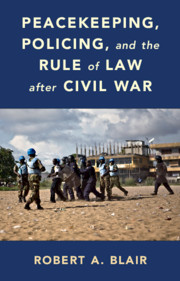Book contents
- Frontmatter
- Contents
- List of Figures
- List of Tables
- Acknowledgements
- List of Abbreviations
- 1 Introduction
- 2 History of UN Intervention and the Rule of Law after Civil War
- 3 Conceptual Framework: Civil War through a Legal Lens
- 4 Theoretical Framework: Restoring the Rule of Law after Civil War
- 5 Cross-national Evidence: UN Intervention and the Rule of Law across Africa
- 6 Sub-national Evidence I: The Rule of Law and Its Discontents in Liberia
- 7 Sub-national Evidence II: Evaluating the UN from the Bottom-Up
- 8 Sub-national Evidence III: UN Intervention and the Rule of Law in Liberia
- 9 Implications for Africa and beyond
- Bibliography
- Index
1 - Introduction
Published online by Cambridge University Press: 09 November 2020
- Frontmatter
- Contents
- List of Figures
- List of Tables
- Acknowledgements
- List of Abbreviations
- 1 Introduction
- 2 History of UN Intervention and the Rule of Law after Civil War
- 3 Conceptual Framework: Civil War through a Legal Lens
- 4 Theoretical Framework: Restoring the Rule of Law after Civil War
- 5 Cross-national Evidence: UN Intervention and the Rule of Law across Africa
- 6 Sub-national Evidence I: The Rule of Law and Its Discontents in Liberia
- 7 Sub-national Evidence II: Evaluating the UN from the Bottom-Up
- 8 Sub-national Evidence III: UN Intervention and the Rule of Law in Liberia
- 9 Implications for Africa and beyond
- Bibliography
- Index
Summary
The rule of law is indispensable for sustained peace, good governance, and economic growth, especially in countries recovering from civil war. Yet for all its importance, the rule of law has received surprisingly little attention from political scientists and international relations scholars. This book proposes a new theory to explain how international organizations can restore the rule of law in the world’s weakest and most war-torn states, focusing in particular on the crucial but underappreciated role of the UN. The book tests the theory by combining analysis of original, highly disaggregated survey data from Liberia with cross-country analyses spanning all post-conflict countries in Africa since 1989. The book combines these quantitative results with qualitative insights gleaned from hundreds of interviews with UN officials, local leaders, citizens, and government and civil society representatives in Liberia and beyond. The book shows that UN intervention can have a deeper, more lasting, and more positive effect on the rule of law than the prevailing pessimism would lead us to believe.
Keywords
- Type
- Chapter
- Information
- Publisher: Cambridge University PressPrint publication year: 2020

